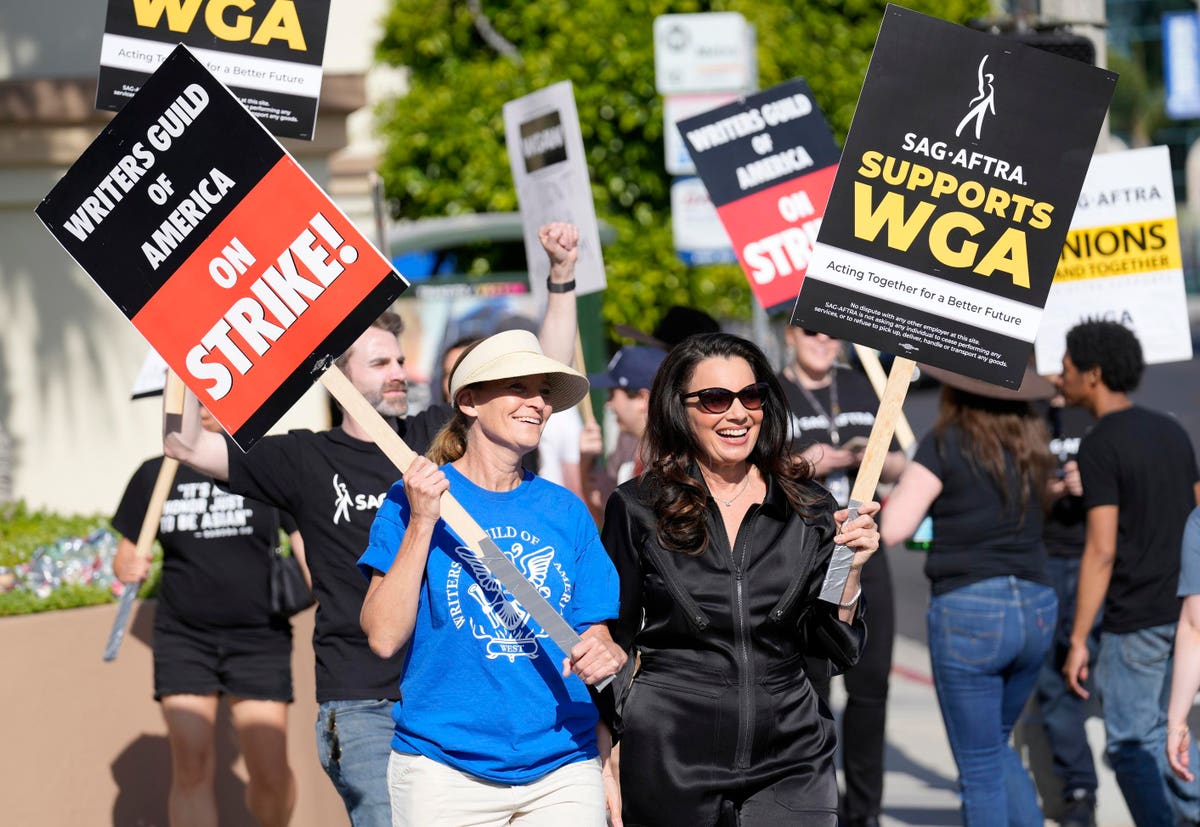One strike is a lot to deal with. Could Hollywood possibly survive the chaos of two strikes simultaneously, taking two of its biggest cogs (writers and actors) out of the equation?
We won’t know the answer for a few more days after Screen Actors Guild-American Federation of Television and Radio Artists (SAG-AFTRA) and the Alliance of Motion Picture and Television Producers (AMPTP) extended their soon-to-expire contract for another few days, pushing decision day behind the July 4 holiday.
Now the contract will expire at midnight on July 12. Yet there’s no indication SAG-AFTRA, which represents the bulk of on-screen talent, is any closer to a deal than the Writers Guild of America, which has been on strike for more than two months.
It would mark the first time in more than six decades (since Ronald Reagan led the actors in 1960) that Hollywood faced a two-union strike. And there’s good reason it’s been avoided to this point. It could be an absolute disaster.
What Will An Actors Strike Mean?
The chaos this could spark isn’t just about more productions grinding to a halt—though that’s certainly a huge concern for the AMPTP. Yet there are also many ancillary issues a SAG-AFTRA strike could cause that are less obvious and would reverberate across industries.
For instance, striking actors may skip press junkets for films, costing not only publicity but also impacting coverage plans for media outlets, who’ll scramble to contextualize releases and may completely eliminate feature plans, like those splashy cover stories on an actor with a big film coming out.
That, in turn, will impact awards season. Press coverage and buzz influence voters. Films released during a strike may see less of both, which can affect their chances of being nominated.
Of course, late-night shows have been off the air for weeks due to the writers’ strike, which has already eaten into promotional efforts. Morning talk shows have maintained production throughout — except many broadcasters and hosts belong to SAG and would be subject to a strike. Kelly Ripa and Mark Consuelos, for instance, are actors in addition to their day job hosting LIVE; they wouldn’t be able to go on-camera.
Another area that will be impacted is reshoots. Hollywood was working overtime in the runup to the writers’ strike trying to grind out as many TV shows and films as possible to have in the hopper in order to weather the strike. But often reshoots are needed when something can’t be fixed in editing or test audiences react poorly to a script element. With actors unavailable, that becomes impossible, which could mean subpar product delivered to audiences—which will come back on the producers.
How about using artificial intelligence to recreate actors in those scenes? That’s part of the issues prompting the strike—actors worry that once-seemingly outlandish prospect could be on the table, and they’re fighting it in the new contract.
Production on many TV shows, including Netflix’s
NFLX
The broadcast networks, in particular, can scarcely afford such a development. Their new seasons are set to debut in fall, as always, and with the medium losing such a big slice of viewership over the past decade to other sources — such as streaming and mobile — it would eliminate the networks’ traditional time to shine.
Finally, the next major awards show, the Emmys, could be canceled if actors strike. Though the Tony and BET Awards happened (albeit in slightly different formats), striking actors won’t appear at an industry awards ceremony. And that’s a significant prestige loss, since the Emmys give TV a time to shine.
How Likely Is An Actors Strike?
SAG-AFTRA has gone to the brink of a strike twice in the past decade, but extra-innings talks (after the initial deadline) resulted in deals.
Still, union members have voted to authorize a strike should no deal be reached by July 12. And many big-name actors recently signed a letter urging leadership to call that strike.
Read the full article here





